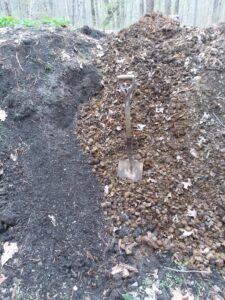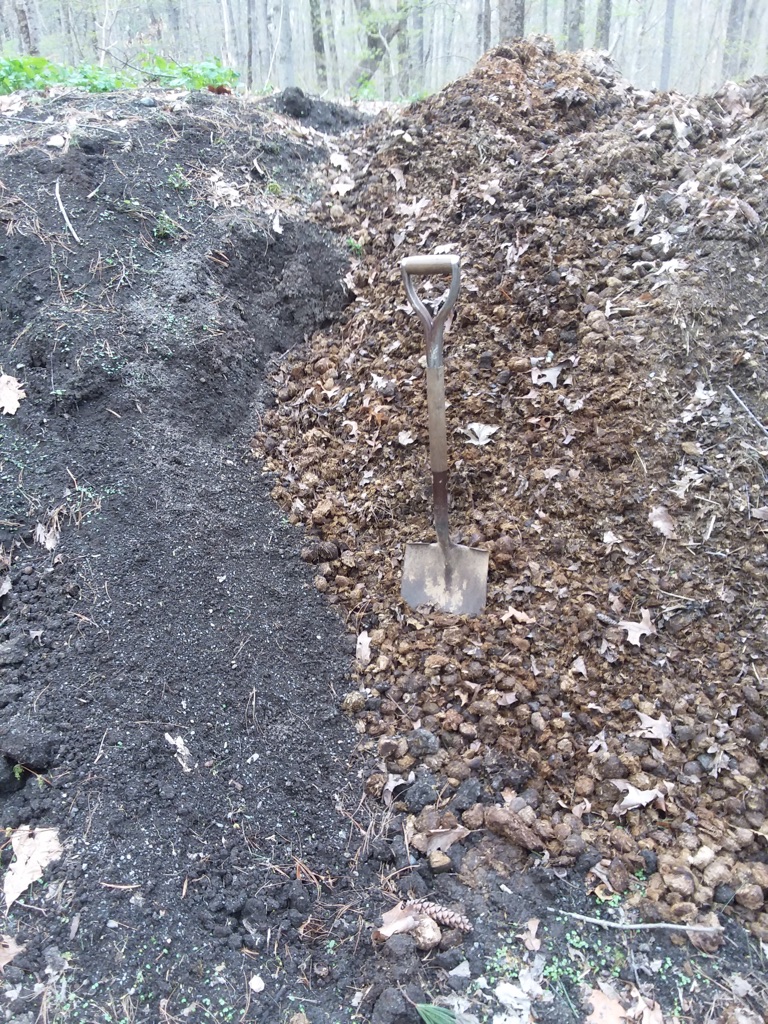From Janet Tice
Gardening is a life long learning experience, a combination of reading how-tos, learning from other gardeners, and trial and error experimentation. One of the things I’ve taken to heart over the years is the mantra of many a Gardeners Exchange presenter: soil matters.
In my garden, which has been carved out of a densely wooded area, the topsoil is thin and of relatively poor quality with a minimum of organic material. Needless to say, not conducive to the lush perennial garden I had in mind. My answer has been to amend the soil by adding compost. This improves soil structure (which in turn enhances both moisture retention and drainage) and contributes garden-healthy microorganisms and nutrients. I dig in copious amounts when creating a new bed, mix it into the soil when adding a new plant and use it to top-dress existing beds every year or so.

You may have read that the most desirable compost is formed from a mix of “green” and “brown” components, the former contributing nitrogen and the latter carbon. Conveniently, barn waste contains both brown (wood shavings and hay) and green (manure). When the ratio of brown to green is ideal, robust microbial activity produces a “hot” compost pile characterized by a high rate of decomposition and rapid compost formation. Hot piles can also be hot enough to kill weed seeds, which pass through the horse’s digestive tract intact. Since my compost pile is cold, a long period of decomposition is needed. (Luckily, weeds aren’t a big problem in my garden, probably due to the abundance of shade.)
Up to this point, most of the work – compost creation – has been done by Mother Nature. Unfortunately, the next step – the actual “top dressing” – requires lots of manual labor: hauling wheelbarrow loads of finished compost from the pile to the garden and spreading it on the perennial beds two inches deep. I usually top-dress in the spring just after new growth has emerged so I know where the plants are and I can easily spread the compost around rather than on top of them. Any earlier and I might smother the new growth and later, once plant growth has crowded the space, it’s a much more difficult and time-consuming job.
As the term implies, top dressing does not require digging the compost into the soil. Biological activity (by worms and microorganisms), chemical decomposition and rainfall serve to break down the material further and deliver it to the root zone. In other words, Mother Nature takes over once again! In a few short weeks the layer of compost has completely “disappeared” from the soil surface without the need for additional effort – plus the roots of the existing perennials are left undisturbed.
Since the nitrogen and other nutrients contained in compost are present in limited quantities, it’s best to think of compost as a means of enhancing soil structure and delivering a healthy dose of beneficial microorganisms, with minuscule amounts of nutrients providing a small added benefit. Annuals, vegetables and perennials that are heavy feeders, requiring lots of supplemental nutrients to perform at their best, may benefit from the application of a commercial fertilizer in addition to top dressing.
As a bonus for those Gardeners Exchange members who have read this far, once the gardening season begins, you are welcome to visit with buckets, heavy-duty plastic trash bags or a pickup truck and take as much “black gold” as you need. I have more compost than I can ever use! Just give me a call in advance so I know you’re coming (members only, please).
